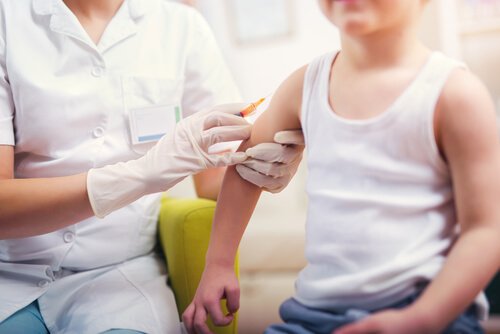What Is the Anti-Vaccine Movement All About?

The anti-vaccine movement is nothing new – it has existed since the first vaccines appeared. The movement is very dangerous because it puts public and individual health at risk.
What’s more, there is no scientific evidence against vaccines. Children and individuals with a repressed immune system are the populations that are most in danger.
How did the anti-vaccine movement come to be?
Anti-vaccine movements can be defined as a collective of people who are against vaccination. They believe that the health risks involved with vaccines or the act of vaccination outweigh the benefits. The reasons for their beliefs against vaccines may be religious, political, philosophical or sanitary.
The origins of the first vaccine go back to the year 1796. In that year, Edward Jenner, a rural English doctor, described the ability to prevent the spread of smallpox. How? By putting healthy individuals in contact with the puss from the wounds of an individual ill with smallpox.
At that same moment, the first vaccine skeptics appeared, even among the medical community. From that time and until today, many countries have suffered outbreaks of preventable illness as the result of the influence of anti-vaxers.
On of the most well-known articles sited by the anti-vaccine movements is one published in 1998 in the The Lancet. The scientific journal’s article associated the measles-mumps-rubella vaccine with autism and other bowel diseases.
Six years later, it was revealed that the main article’s author, Andrew Wakefield, had financial conflicts of interest. These drove him to modify the results of the study for his own benefit.

Several co-authors of the same article ended up retracting the conclusions supposedly obtained by the study. Unfortunately, the damage had already been – and continues to be – done. The fraudulent article created a state of panic and produced a decrease in the rates of immunization. In turn, failure to vaccinate has led to outbreaks of the same diseases.
What does the anti-vaccine movement base itself on?
Different studies have analyzed the content of anti-vaccine websites. Some of the arguments that these groups claim can be divided into the following categories:
As state above, there are a variety of reasons that different groups argue against vaccination. The arguments that they claim can be divided into the following categories:
- Religious beliefs. According to certain religions, vaccines are an external and unnecessary intervention on the human body.
- Philosophical reasons. These groups believe that the obligatory nature of immunizations (present in some countries) is a violation of a person’s individual rights.
- Lack of effectiveness. Some believe that the decrease in vaccine-preventable illnesses isn’t actually a result of vaccinations themselves. Rather, they claim, the decrease is a product of socio-economic improvements.
- Risks and consequences associated with vaccination. These arguments center on possible side effects of vaccines and vaccination. They draw connections between vaccination and certain illnesses, especially idiopathic (unexplained) conditions and those that alter one’s immunity.
- Economic profiting. Here, arguments focus on the economic benefit gained by pharmaceutical companies, health companies and laboratories. Furthermore, they point to the lack of transparency among the parties that intervene in the vaccination chain.
- Other arguments. Anti-vaxers may also make reference to the pain caused by injections, possible consequences of poor technique when applying vaccines, etc.
What are the benefits that vaccines offer?
Vaccines represent one of the biggest advancements in the history of medicine. Science has proven that vaccines prevent millions of deaths every year.
In the same way, millions of people around the world die every day as a result of vaccine-preventable illnesses. This may be because of lack of access to the vaccines, or as a direct result of the anti-vaccine movement.
Here are some of the most important characteristics of vaccines:
- Vaccines are safe. They’re one of the safest medical products that exists. Vaccines must undergo numerous safety controls.
- They don’t produce the illness that they vaccinate against.
- Vaccines don’t cause autism (Furthermore, the illnesses they prevent are much more serious and life-threatening than autism itself).
- The possibility of side effects is always present. However, the benefits of vaccines always outweigh the chances of possible risks.

- Vaccines are widely effective.
- Their protection is long-lasting, although some vaccines require additional doses.
- Vaccines are necessary in order to maintain the protection of individuals and the population against illness.
- The protection of a child’s health is an ethical matter of undeniable moral value.
- Independent scientific evidence supports the use of vaccines.
Other benefits of vaccines
Currently, there are no alternatives to vaccines that have proven to be better (or even close) to the vaccines themselves. In every state in the US, children must have their immunizations in order to attend school. That being said, however, 47 states allow for exceptions on the basis of religious or philosophical objections.
Just the same, parents have a civic and moral obligation to protect their children. Doing so allows for the construction of a better society in which we protect ourselves and, especially, those who don’t have the opportunity to be vaccinated.
Today, we’re widely unaware of the gravity of many childhood illnesses because we ourselves haven’t witnessed their horror. While improvements in hygiene have no doubt contributed to the decrease in their occurrence, we cannot deny the role of vaccines in their eradication.
Unfortunately, the anti-vaccine movement now puts small children and other vulnerable individuals at risk of contracting vaccine-preventable illnesses.
The anti-vaccine movement is nothing new – it has existed since the first vaccines appeared. The movement is very dangerous because it puts public and individual health at risk.
What’s more, there is no scientific evidence against vaccines. Children and individuals with a repressed immune system are the populations that are most in danger.
How did the anti-vaccine movement come to be?
Anti-vaccine movements can be defined as a collective of people who are against vaccination. They believe that the health risks involved with vaccines or the act of vaccination outweigh the benefits. The reasons for their beliefs against vaccines may be religious, political, philosophical or sanitary.
The origins of the first vaccine go back to the year 1796. In that year, Edward Jenner, a rural English doctor, described the ability to prevent the spread of smallpox. How? By putting healthy individuals in contact with the puss from the wounds of an individual ill with smallpox.
At that same moment, the first vaccine skeptics appeared, even among the medical community. From that time and until today, many countries have suffered outbreaks of preventable illness as the result of the influence of anti-vaxers.
On of the most well-known articles sited by the anti-vaccine movements is one published in 1998 in the The Lancet. The scientific journal’s article associated the measles-mumps-rubella vaccine with autism and other bowel diseases.
Six years later, it was revealed that the main article’s author, Andrew Wakefield, had financial conflicts of interest. These drove him to modify the results of the study for his own benefit.

Several co-authors of the same article ended up retracting the conclusions supposedly obtained by the study. Unfortunately, the damage had already been – and continues to be – done. The fraudulent article created a state of panic and produced a decrease in the rates of immunization. In turn, failure to vaccinate has led to outbreaks of the same diseases.
What does the anti-vaccine movement base itself on?
Different studies have analyzed the content of anti-vaccine websites. Some of the arguments that these groups claim can be divided into the following categories:
As state above, there are a variety of reasons that different groups argue against vaccination. The arguments that they claim can be divided into the following categories:
- Religious beliefs. According to certain religions, vaccines are an external and unnecessary intervention on the human body.
- Philosophical reasons. These groups believe that the obligatory nature of immunizations (present in some countries) is a violation of a person’s individual rights.
- Lack of effectiveness. Some believe that the decrease in vaccine-preventable illnesses isn’t actually a result of vaccinations themselves. Rather, they claim, the decrease is a product of socio-economic improvements.
- Risks and consequences associated with vaccination. These arguments center on possible side effects of vaccines and vaccination. They draw connections between vaccination and certain illnesses, especially idiopathic (unexplained) conditions and those that alter one’s immunity.
- Economic profiting. Here, arguments focus on the economic benefit gained by pharmaceutical companies, health companies and laboratories. Furthermore, they point to the lack of transparency among the parties that intervene in the vaccination chain.
- Other arguments. Anti-vaxers may also make reference to the pain caused by injections, possible consequences of poor technique when applying vaccines, etc.
What are the benefits that vaccines offer?
Vaccines represent one of the biggest advancements in the history of medicine. Science has proven that vaccines prevent millions of deaths every year.
In the same way, millions of people around the world die every day as a result of vaccine-preventable illnesses. This may be because of lack of access to the vaccines, or as a direct result of the anti-vaccine movement.
Here are some of the most important characteristics of vaccines:
- Vaccines are safe. They’re one of the safest medical products that exists. Vaccines must undergo numerous safety controls.
- They don’t produce the illness that they vaccinate against.
- Vaccines don’t cause autism (Furthermore, the illnesses they prevent are much more serious and life-threatening than autism itself).
- The possibility of side effects is always present. However, the benefits of vaccines always outweigh the chances of possible risks.

- Vaccines are widely effective.
- Their protection is long-lasting, although some vaccines require additional doses.
- Vaccines are necessary in order to maintain the protection of individuals and the population against illness.
- The protection of a child’s health is an ethical matter of undeniable moral value.
- Independent scientific evidence supports the use of vaccines.
Other benefits of vaccines
Currently, there are no alternatives to vaccines that have proven to be better (or even close) to the vaccines themselves. In every state in the US, children must have their immunizations in order to attend school. That being said, however, 47 states allow for exceptions on the basis of religious or philosophical objections.
Just the same, parents have a civic and moral obligation to protect their children. Doing so allows for the construction of a better society in which we protect ourselves and, especially, those who don’t have the opportunity to be vaccinated.
Today, we’re widely unaware of the gravity of many childhood illnesses because we ourselves haven’t witnessed their horror. While improvements in hygiene have no doubt contributed to the decrease in their occurrence, we cannot deny the role of vaccines in their eradication.
Unfortunately, the anti-vaccine movement now puts small children and other vulnerable individuals at risk of contracting vaccine-preventable illnesses.
All cited sources were thoroughly reviewed by our team to ensure their quality, reliability, currency, and validity. The bibliography of this article was considered reliable and of academic or scientific accuracy.
- Adam A. (2015). Vacunación, antivacunación y los derechos del paciente menor. Gac. int. cienc. forense ISSN 2174-9019. Nº 16. Julio-Septiembre, 2015. Disponible en: https://www.uv.es/gicf/2TA1_Adam_GICF_16.pdf
- Aparicio Rodrigo M. (2015). Antivacunas: un reto para el pediatra. Rev Pediatr Aten Primaria [Internet]. 2015 Jun [citado 2019 Abr 17] ; 17( 66 ): 107-110. Disponible en: http://dx.doi.org/10.4321/S1139-76322015000300001
- Bello J. (2017). La actitud antivacuna como enfermedad emergente, la responsabilidad de la Administración y la asistencia primaria de pediatría. Rev Enf Emerg.
- López Santamaría MA. (2015). Los movimientos antivacunación y su presencia en internet. ENE, Revista de Enfermería. v. 9, n. 2, ago. 2015. ISSN 1998 348X. Disponible en ene.enfermeria.org
- Rosell Aguilar I. (2017).“Antivacunas” y dudas parentales en vacunación infantil: recuperemos la confianza en los profesionales sanitarios. CLINICA, num.26 (2017): 3 – 10 ISSN: 0301 – 0392. Disponible en: https://revistas.uva.es/index.php/clinica/article/view/1250/1086
This text is provided for informational purposes only and does not replace consultation with a professional. If in doubt, consult your specialist.








